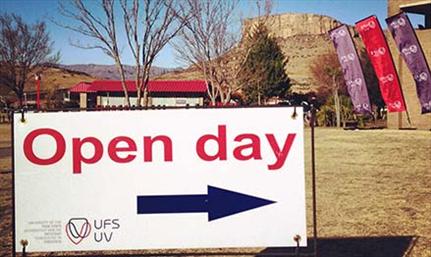Latest News Archive
Please select Category, Year, and then Month to display items
05 June 2018
Photo Supplied
 Archaeological excavations in the Wonderwerk Cave, north of Kuruman in the Northern Cape.
Archaeological excavations in the Wonderwerk Cave, north of Kuruman in the Northern Cape.
Research fellow Dr Lloyd Rossouw from the Department of Plant Sciences at the University of the Free State (UFS) recently published an article in the Nature Ecology and Evolution journal with Dr Michaela Ecker from the University of Toronto as lead author, and Dr James Brink, research fellow at the UFS Centre for Environmental Management. The findings described in “The palaeoecological context of the Oldowan-Acheulean in southern Africa” provides the first extensive paleoenvironmental sequence for the interior of southern Africa by applying a combination of methods for environmental reconstruction at Wonderwerk Cave, which have yielded multiple evidence of early human occupation dating back almost two million years ago.
Where water once was
The Wonderwerk Cave is found north of the Kuruman hills (situated in Northern Cape) a 140m long tube with a low ceiling. The surroundings are harsh. Semi-arid conditions allow for the survival of only hardy bushes, trees, and grasses. But during the Early Pleistocene, stepping out of the Wonderwerk Cave you would have been greeted by a completely different site, the researchers found. Using carbon and oxygen stable isotope analysis on the teeth of herbivores (Dr Ecker), fossil faunal abundance (Dr Brink), as well as the analysis of microscopic plant silica remains (phytoliths) excavated from fossil soils inside the cave (Dr Rossouw), the results show that ancient environments in the central interior of southern Africa were significantly wetter and housed a plant community unlike any other in the modern African savanna.
What difference does it make?
While East African research shows increasing aridity and the spread of summer-rainfall grasslands more than a million years ago, the results from this study indicate an interesting twist. During the same period, shifts in rainfall seasonality allowed for alternating summer and winter-rainfall grass occurrences coupled with prolonged wetlands, that remained major components of Early Pleistocene (more or less the period between one and two million years ago) environments in the central interior of southern Africa. That means our human ancestors were also living and evolving in environments other than the generally accepted open, arid grassland model.
Qwaqwa Campus Open Day a big success
2013-08-12
|
 |
12 August 2013
Photo: RooistoelTV |
Thousands of learners in their colourful uniforms descended on the UFS Qwaqwa Campus to attend Open Day 2013.
This annual event enables learners and community members to know more about the study programmes that the campus offers as well as information regarding financial aid opportunities, sports and culture, health and wellness, residence life, amongst others.
During the formal welcome session, the learners were given a better understanding of what the university is all about.
Campus Principal Prof Prakash Naidoo gave the learners what he referred to as the top reasons why all the students in attendance would find it attractive to enrol with the Qwaqwa Campus in 2014.
“We have a diverse culture where everybody feels welcomed. We are also the fastest transforming university in the world. Our unique UFS101 learning programme teaches you about life in general. There’s no doubt that we have the best Vice Chancellor and Rector in Prof Jonathan Jansen,” Prof Naidoo said.
In encouraging learners to work harder in order to achieve the goals that they had set for themselves, Dr Elsa Crause, Campus Vice Principal: Academic and Research, emphasised on the importance of reading. “Reading and studying hard are important if you are to succeed in life. For you to achieve the best and to make your student life interesting, you must read as much as you write,” she said.
After the formal welcome session that included entertainment by students, the learners were ushered to various faculties and departments to give them first-hand experience of what it feels like to be a Kovsie.